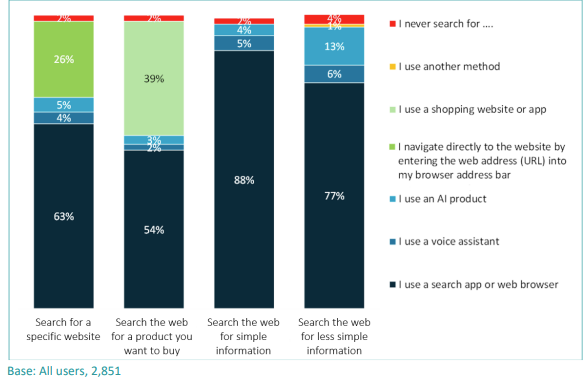
Move over SEO, there’s a new acronym-based optimisation kid on the block. 2025 has introduced corporate affairs teams to GEO: generative engine optimisation.
GEO aims to provide a framework for helping brands and businesses monitor and manage their reputations within generative AI platforms like ChatGPT and Copilot.
The search landscape has been in flux for a long time, but the impact generative AI has had on search in a short space of time is remarkable.
Don’t click away: AI has changed our search habits
In response to the rise of ChatGPT, Google is in the process of reworking its entire model to include AI-generated summaries that encourage you NOT to click on a third-party website.
Around 55% of searches include these summaries; they’re even more prevalent for question-based searches, where they appear 75% of the time.
This reactive move to AI search summaries builds on the long-standing trend of “zero click” searches that provide relevant information sourced from a third party within Google, rather than necessitating a click away. Zero click searches have made up around 50% of Google queries since 2019.
The impact of generative AI on SEO is reflected not just in the platforms we use to search for information, but also HOW we search for that information.
Searching questions: how to manage the impact of AI
According to recent research by the Competition and Markets Authority, an average of 4% of people regularly use generative AI for search. But that number jumps to 33% when regular AI users require specific or complicated information:

(Source: CMA Mobile Consumer Survey: Search Questions, June 2025)
And given that comms and corporate affairs often find themselves dealing with complex and highly nuanced situations, this shift in how audiences explore such issues will have some critical knock-on effects.
At Headland, we’ve picked out three clear implications generative AI powered search has for comms and corporate affairs teams.
1. Identify the questions your audiences might ask about you
Rather than simply optimising against specific keywords like “best sofas”, forward-thinking businesses use the data they have available to identify the questions their audiences ask about them. Then, the task is to create articles and pages that answer those questions in a way that appeals to Google and genAI’s crawlers.
The new AI search panels in Google provide supporting evidence links, and our research shows that these tend to be populated by companies’ own websites and top tier media outlets. A mix of owned and earned media can be employed in an attempt to influence the results. However, given this functionality is still relatively new, it remains to be seen how quickly (or if at all) businesses can influence the results.
You can use third-party tools like Answer The Public to understand what questions users are searching in regard to your brand and audit your current content to see if it stacks up. If not, you may want to consider adding content that answers these questions to your website in future.
2. Track what generative AI services say, and how that evolves
In response to the rise of GEO (generative engine optimisation), a number of services have sprung up which aim to help businesses track their mentions in the big genAI platforms.
At Headland, we’ve been beta testing a tool called AIQ, which can track specific questions about your business across ChatGPT, Copilot, Gemini and Perplexity. AIQ tracks the response in genAI over time, enabling businesses to see how the external environment affects the tone and content of responses.
The tool also enables us to see the source links generative AI platforms use to populate their answers. Again, this provides the opportunity to test a new approach and track the impact of that approach over time.
3. Acknowledge the limits and place GEO in context
GEO has become increasingly important over the past six months, but unlike with Google, we have limited visibility into what users ask or search for on those generative AI platforms.
Whereas Google provides a window into what the world searches for, we have no such insight into how people use genAI platforms. Businesses will need to correlate data from other sources – such as search volume, organic search traffic to their websites, inbound media queries – to inform their approach.
Building genAI optimisation on the back of these proxies, alongside utilising the monitoring offered by tools like AIQ, will help track the impact of GEO activity. But there will be an element of in-depth stakeholder research required if businesses want to understand whether ChatGPT responses have affected their perception among policy makers, investors or employees.
Navigating the new landscape of reputation management
Looking at the bigger picture of both search and GEO, it’s clear that we can expect further changes in the landscape over the coming months and years. But it’s also clear that looking at reputation through the lens of search can no longer be done purely by analysing Google data.
The businesses best placed to win will be those who have a clear picture of how the different platforms portray their reputation – and the levers they can realistically pull to affect it.
Read more Insights & News
